1. Impurity must certainly take the first place. Investigation seemed to show that the majority of these men were immoral in peace time, but the war has intensified this evil. This would be accounted for to a large extent by the unnatural conditions under which the men are forced to live, and the policy of the military authorities, who are often concerned merely with the fighting fitness of the men, rather than with the moral issues. However this may be, in nearly every camp or battalion or regiment or body of men questioned, whether among officers or men, the majority were confessedly living in immorality. This in itself is a staggering fact. It could be supported here by numerous statements or authorities and by much evidence.
2. Obscene and profane language is sweeping like an epidemic through the camps. It is infectious, and the worst men, who are the loudest talkers, tend to set the standard, so that evil is rapidly and unconsciously propagated until the very atmosphere becomes saturated. It is some comfort to know that frequently words are used unthinkingly and without a full realization of their original meaning. It is also comforting to be assured that there is not much deliberate telling of obscene stories. As one man puts it, “There are few essentially rotten minds.” When, however, the name of our Lord is used not only profanely, but dragged into the most obscene and horrible connections, unheard of in peace times, no possible excuse can be offered and the habit cannot but prove deadening and baneful in its influence. Men who never before thought of swearing find themselves driven to strong language and to reckless, heightened, or intensified expression in the trying and persistent strain of war time.
3. Drunkenness has always proved the danger of the soldier. The discipline of the army has lessened this evil within the camps. Certainly it is being sternly suppressed and severely punished by the authorities among the newly arrived American troops. The rum which is given to the soldiers of the British army before a charge, or in the extreme cold of the trenches, has taught some men to drink who had not contracted the habit before. It is also a fact that the drink bill of England has increased during the war. Lloyd George said: “We are fighting against Germany, Austria, and Drink; but the greatest of these three deadly foes is Drink.” The drink trade of England is maintained on the one hand by the powerful vested interests and the respectable moderate drinkers at the top of society, who are not willing to sacrifice their selfish comfort for the weaker brother, and on the other hand by the demand of the laboring classes who will have their beer, and whom the government does not dare oppose in the present crisis. Drink has been a curse to Britain during the war.
4. Gambling is a danger to the soldier. It is strictly forbidden in most of its forms by the military authorities. The game of “House” is tolerated as a mild form of gambling, where the men play for hours for very small stakes in order to kill time. The game of “Crown and Anchor” is also popular.




